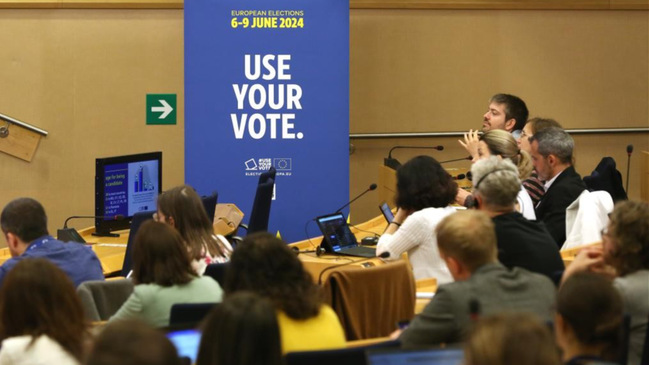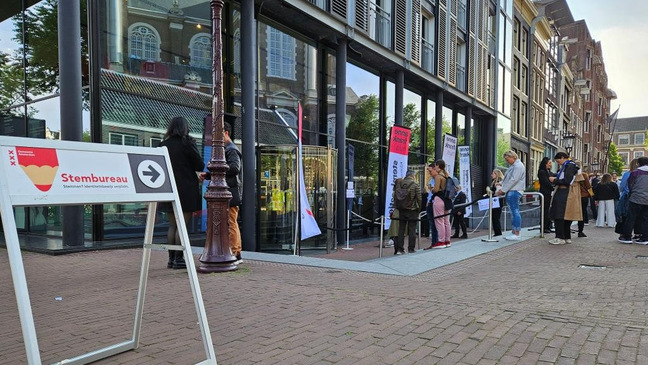
Journalists attend a media briefing on the European Parliament elections at the European Parliament in Brussels, Belgium, June 6, 2024. /Xinhua
Editor's note: Liu Lirong, a special commentator on current affairs for CGTN, is an associate professor at the Institute of International Studies, Fudan University. The article reflects the author's opinions and not necessarily the views of CGTN.
This year's European Parliament elections are facing a sharply rightward-shifting Europe. Over the past five years, the support for mainstream parties in many European countries has continued to decline, while the support for far-right parties has steadily increased. The rise of populism has led to the increasing polarization of the European party system at the EU and member state levels. Political polarization makes it more difficult for EU countries to find solutions to complex problems. In this context, incidents of political violence have been on the rise.
The intensification of political polarization is a global phenomenon. The main reason for European political polarization is the increasing disconnect between EU elite politics and the public, reflected in the following aspects.
First, there is a crisis in the EU's policy-making system. To be precise, the EU is an economically integrated community governed by technocrats rather than a politically integrated community governed by democratic rule of law. Since the outbreak of the Russian-Ukrainian conflict, elite politicians in Europe have emphasized the conflict of values while ignoring the impact of global capital on people's livelihoods.
Unlike the democratic mechanisms of member states, the EU's legitimacy does not derive from the political decision-making process. The elected European Parliament lacks transparency, and major EU decisions are made through negotiations among member state governments. The European public lacks trust in EU politics due to the absence of rational dialogue mechanisms.
Besides, the external crises have led to a rift in European public opinion. At present, Europe faces many problems in political, economic and social development.
The Russian-Ukrainian conflict is dragging down the European economy, and the Israeli-Palestinian conflict has triggered a geopolitical crisis. With the increasing number of refugees, many European countries are overwhelmed, and anti-immigrant sentiments among the public are on the rise. The environmental protection policies promoted by the European Green Party have raised concerns about deindustrialization, impacting the economy and livelihoods and causing public discontent. European voters favored extremist parties, partly because of the uncertainty caused by the external crisis.
Moreover, the ideological gap between political parties in the European political spectrum has gradually widened. Since the European debt crisis, traditional mainstream parties have gravitated towards the political center, with the political platforms of center-left and center-right parties becoming increasingly similar.
The grand coalition government formed by Germany's Union parties and the Social Democratic Party had been in power for 12 years, making it difficult for voters to distinguish between various political choices ideologically. This created more space at the edges of the political spectrum, providing opportunities for the development of radical right-wing and left-wing parties. The political polarization of the European Union and its member states is mainly manifested as a conflict between radical politics and mainstream governance.

People queue to cast their ballots at a polling station in Amsterdam, the Netherlands, June 6, 2024. /Xinhua
Furthermore, the power of the European middle class has been declining in recent years, with anti-globalization and anti-immigration sentiments spreading among the populace. The middle class has been the main driving force behind European integration. However, faced with the impacts of globalization and technological change, the interests of the European middle class have been difficult to safeguard, and their competitiveness has weakened.
As the crises in Europe become normalized, the welfare state system is being challenged and social inequality is worsening. Many voters, who believe that mainstream policies have failed, are dissatisfied with traditional political parties, placing their hopes in radical alternatives. This uncertainty has driven some voters toward nationalism, xenophobia or trade protectionism.
Fifth, the confrontation between different groups in European society is intensifying. The 21st century is an era of information overload yet a lack of quality news. Digital social media is a mix of genuine and false information, making it difficult to distinguish truth from falsehood, and easily manipulating public emotions, leading to aggregation effects.
Issues such as the Russia-Ukraine conflict, the Israeli-Palestinian conflict, gender, minority groups, immigration, and the environment divide individuals into completely opposing camps. On one hand, the media tends to report on divisive topics, creating an impression of intensified political polarization. On the other hand, the dissemination through social networks fuels populism and political radicalization.
The sharp rightward shift in the European Parliament may impact the EU's political ecosystem and social development. Political polarization will further weaken public trust in the political system, leading to social divisions and media polarization.
The European Parliament is the EU's supervisory, advisory and legislative body, and the alliances of various political factions will have a significant impact on EU-level policymaking. In addition, the European Parliament elections will also affect the domestic politics of member states.
In Europe, countries particularly affected by immigration or economic crises are those where political polarization is most pronounced. The EU and its member states often take a contemptuous or stigmatizing attitude when dealing with political polarization. For example, German elite politics attempts to provide impetus for political change by banning populist parties as a partial or temporary solution, rather than seeking change. Ignoring the public's demands for change will only further deepen their dissatisfaction with the EU elite politics.






